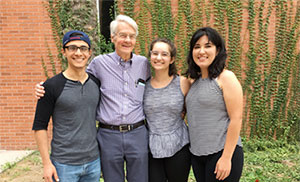Your Genes Are Not Your Destiny
Central to all public health academic courses taught at the University of Arizona Mel and Enid Zuckerman College of Public Health is the study of epidemiology, the branch of medicine that deals with the incidence, distribution, and search for the causes and control of disease in a population.
Burris “Duke” Duncan, MD, professor emeritus of pediatrics and public health, teaches a class called Biology in Public Health that goes beyond prevention of disease at a population level. He is also teaching students how they can avoid chronic disease through diet and stress management.

The class focuses on the ways in which genes do not entirely determine your destiny in terms of personal health. As Dr. Duncan likes to say, “Your genes are not your destiny.”
The semester is structured across the lifespan, ranging from birth to aging and addresses a different chronic disease each week. In addition to guest lecturers who talk about the biology and epidemiology of different chronic diseases, the discussion includes information about the impact of diet and stress relative to the disease.
Dr. Duncan humanizes the topic for students by bringing in guest speakers who have personally experienced disease and candidly talk about how it has affected their life.
Students also have a chance to put what they are learning into practice through multiple experiential learning opportunities. At the beginning of each class, students participate in a guided meditation.
"Leading meditation in class was powerful. It reminded me that, as public health practitioners, the promotion of health outside ourselves has to start with an inner feeling of peace," said Lucía Duran, a student in the class and meditation instructor.
Outside of class, students have the opportunity to participate in a voluntary 10-day whole foods plant-based diet. The experience focuses on minimizing their consumption of animal protein and processed foods. The students are provided with a catered lunch and dinner from Urban Fresh, a local Tucson vegan restaurant. Key biometric markers related to chronic disease are measured before and after the course and shared with students to help them understand the impact of the diet on their personal health.
Ultimately, the hope is that students put the concepts they are learning into practice, not only in their future public health careers but in their own life.
“The components learned in class about the importance of factors that can directly impact our health such as stress, diet, physical activity, and sleep have truly impacted my daily living,” said Edgar Villavicencio, a student in the class.
By Rachel Leih, Research Specialist; Teaching Assistant; Graduate Student, MPH-Global Health at the University of Arizona Mel and Enid Zuckerman College of Public Health and Katharine Hoffman, Graduate Intern and Online MPH student at the University of New England.

